Brief

Auf einen Blick
- Recent policy changes have raised new prospects for wealth management, insurance, and lending in China’s Greater Bay Area.
- Among customers in China and Hong Kong, there is significant interest in cross-boundary products for their unique features and ability to diversify exposure, our research finds.
- To prepare, financial services companies can begin taking immediate “no-regrets” steps such as investing in brand building, while simultaneously developing the customer-centered innovations, omnichannel services, and operating models that will help them long term.
Encompassing Hong Kong, Macau, and nine cities in Guangdong province, China’s Greater Bay Area (GBA) has a population of more than 70 million and gross domestic product (GDP) growth of roughly 8% per year over the past decade. With a GDP of approximately $1.7 trillion, the area’s economy is similar in size to Canada and South Korea (see Figure 1).
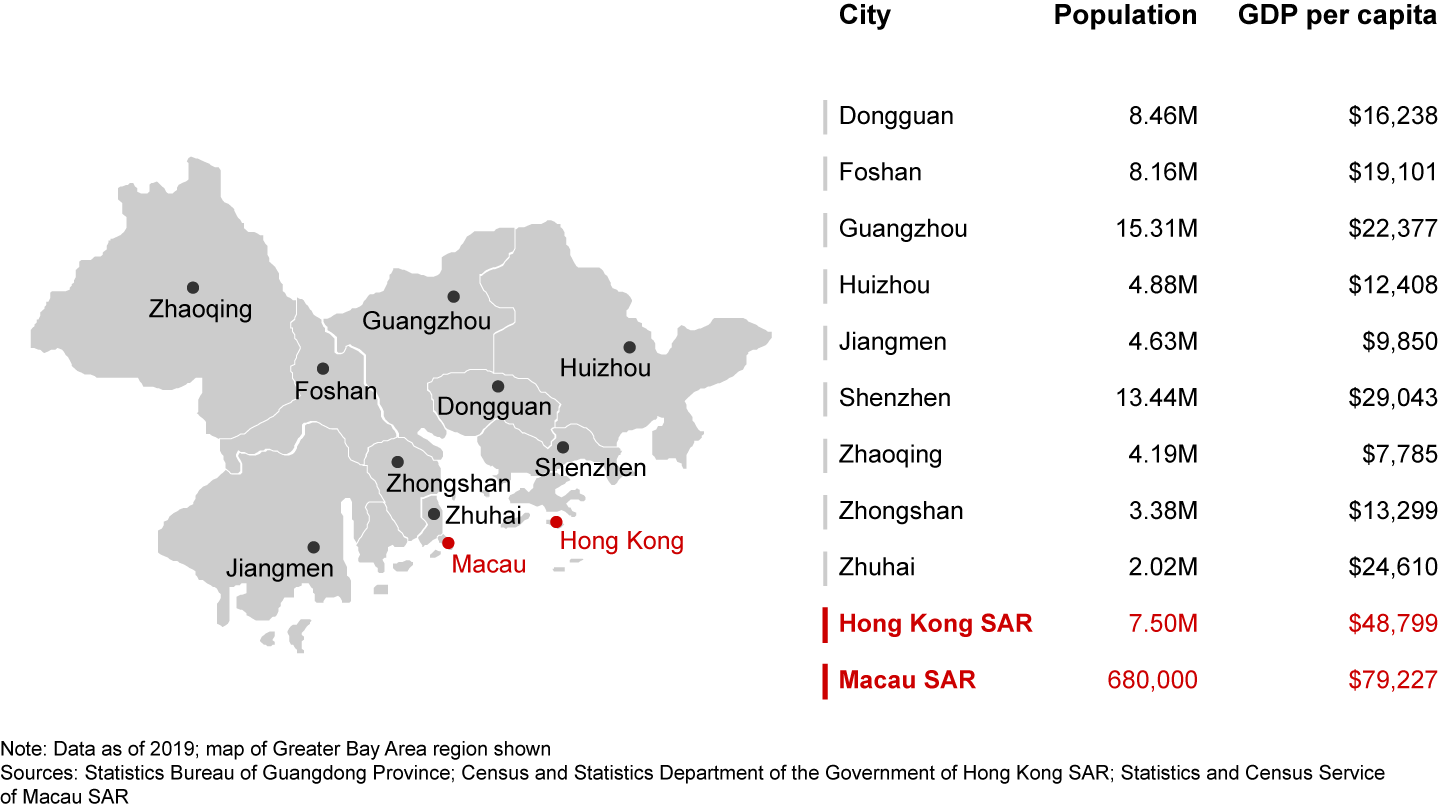
Thanks to rising economic activity and an expanding affluent population, the GBA is an attractive market for wealth management, insurance, and lending products, and is supported by recent government action. In May 2020, Chinese financial services regulators jointly issued opinions on financial support for the area’s development. Their key themes included: enabling cross-boundary financial services, supporting the opening of Chinese financial markets, facilitating the integration of GBA financial markets and infrastructure, and encouraging financial services innovation. While details remain uncertain, the announcement of further guidelines and policies to facilitate closer collaboration among the financial markets of GBA seems likely in the near future.
Written with contributions from
Written with contributions from

In November 2020, we surveyed over 3,000 retail customers and small and medium-sized enterprises (SMEs) within the GBA. Our aim was to understand mainland and Hong Kong customers’ preferences and attitudes toward cross-boundary financial services and products, such as an insurance policy that a Hong Kong resident purchases from the mainland, or vice versa. We found that individuals and businesses in both China and Hong Kong have a strong interest in such cross-boundary financial products (see Figure 2).
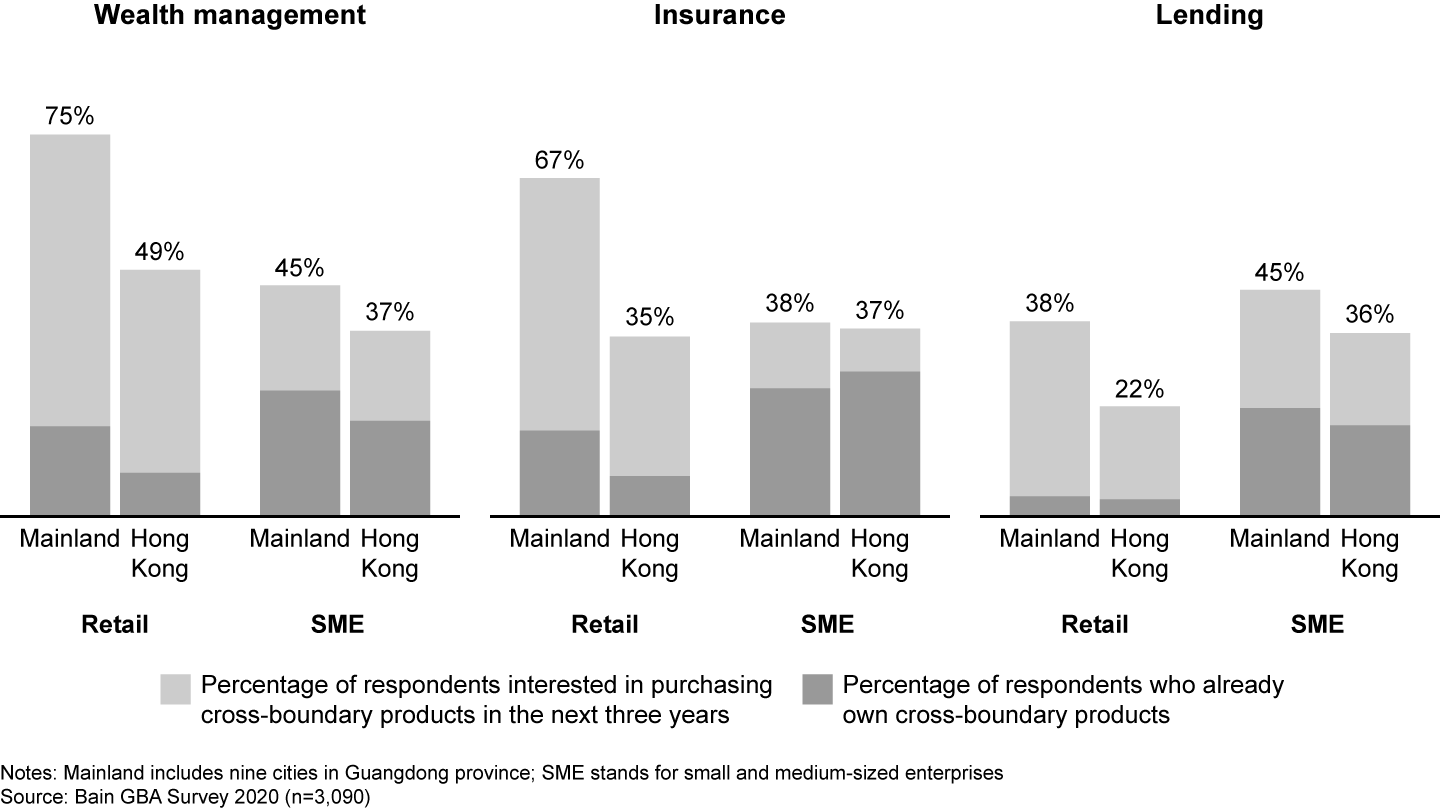
Opportunities for wealth management, insurance, and lending
The greatest immediate financial services opportunity appears to be in wealth management, based on our customer survey and recent policy developments. Today, fewer than 20% of GBA retail customers own cross-boundary wealth products, and respondents who do not yet own these products have a strong interest in them. Among mainland GBA retail customers who do not own Hong Kong wealth management products, 70% are interested in making such a purchase in the next three years.
There is already an infrastructure for some cross-boundary trading in stocks (Stock Connect) and bonds (Bond Connect), as well as distribution of funds (Mutual Recognition of Funds). While implementation details have not been fully announced, we anticipate that the soon-to-launch Wealth Management Connect government initiative will facilitate access to additional cross-boundary wealth management products, likely beginning with low- to medium-risk ones and potentially progressing to more complex products in the future. To ensure appropriate risk and capital controls, the Wealth Management Connect is expected to operate under a closed-loop system of cross-boundary fund flow and be subject to fund-flow quotas.
Insurance, on the other hand, is still nascent in mainland GBA cities. In those cities, life and property-and-casualty insurance penetration was about 6% in 2019, low compared with developed markets, where penetration is about 10%, and Hong Kong, where it is 18%. Closing the gap with developed markets could result in additional premiums of $50 billion. As awareness of the need for insurance and retirement planning increases among mainland customers, products such as health and annuity insurance are becoming more popular, says Jack Jiang, chief customer officer for AIA China.
Without the preexisting regulatory infrastructure that wealth management enjoys, it may be some time before cross-boundary insurance sales are permitted. However, recent moves such as allowing mainland insurers to collaborate with third parties in Hong Kong and Macau to provide medical treatment, and suggestions that insurers may soon set up GBA service centers to provide after-sales service for cross-boundary policyholders, show that opportunities are opening for insurers in the region. They would be smart to take advantage of this, as our survey shows strong demand from consumers for these types of products across the GBA.
For lenders, increased mobility within the GBA will likely fuel demand for mortgages and lead to additional cross-boundary opportunities. There remain technical challenges that the industry and regulators must resolve―including cross-boundary know-your-customer, data privacy, and capital control requirements in China―but there certainly seems to be potential. According to our survey, 20% of mainland retail customers and 10% of Hong Kong retail customers would consider getting a mortgage from an institution across the boundary in the next three years. Businesses in mainland China are interested, too; 45% of mainland SMEs either already borrow from Hong Kong financial institutions or are considering doing so in the next three years.
Much remains uncertain today, including the pace and scope of future regulatory changes, population migration, and trade activities, and companies may face challenges and difficulties such as creating products and services that satisfy the different regulations and tax regimes of the region. Nevertheless, this remains an important moment for the GBA financial services ecosystem. Many financial institutions have already committed to investing. Standard Chartered, for example, has spent $40 million to set up a GBA center in Guangzhou to support its retail and corporate banking business in the region.
There are “no-regrets” moves that banks and insurers can make right now―such as launching marketing campaigns to improve brand awareness―and setting up insurance service centers when the time is right. Investing now in marketing that emphasizes trustworthiness, a key purchasing criterion among customers we surveyed, will help set up companies for success later. A strong brand will be critical to winning mainland customers, as word of mouth is still an important marketing tool, says Lucia Ku, head of customer propositions and management at Hang Seng Bank.
Our survey and industry interviews indicate that over the long term, financial services companies can effectively position themselves to make the most of the opportunity in China’s Greater Bay Area by taking three specific actions.
1. Distinguish themselves with innovative products and services tailored to the specific needs of GBA customers
While it is always important to understand customers and their motivation, it will be especially helpful for financial services firms in the GBA. Understanding the appeal of cross-boundary products and services and knowing how to design them within the regulatory framework of the GBA will help companies appeal to a variety of customers and establish a strong presence in the region. Rather than focus exclusively on existing products, companies should develop differentiated offerings that match the priorities of customer segments across the region.
Product innovation will need to be tailored to cross-boundary customer needs and be rapid enough to keep up with regulatory changes. This can be challenging, but new products are already hitting the market. Several Hong Kong banks, including Chong Hing Bank, Industrial and Commercial Bank of China (Asia), and the Bank of East Asia, have begun offering mortgage service to Hong Kong residents who purchase property in select mainland cities in the GBA, such as allowing them to apply for or repay the mortgage within Hong Kong. Cross-boundary auto insurance is another product under active discussion, according to Selina Lau, chief executive of the Hong Kong Federation of Insurers (HKFI).
For wealth management products, mainland GBA retail respondents to our survey indicated that they are interested in Hong Kong products that allow them to diversify their portfolio with exposure to international markets and gain access to better wealth advisory services (see Figure 3). There is also substantial interest in Chinese investments from Hong Kong investors looking for higher potential returns, says Ryan Song, vice chairman and chief executive of Hang Seng Bank (China). To address this need, fund management companies, including Hang Seng Investment Management, have been participating in the pioneering Hong Kong-Mainland ETF Cross-Listing Scheme since October 2020, expanding Hong Kong customers’ exposure to Chinese investments.
In cross-boundary insurance, our survey indicates almost 80% of mainland GBA retail respondents are interested in their unique product features such as cross-boundary medical coverage and foreign currency-denominated policies. As Hong Kong and Macau citizens increasingly consider retiring to more affordable mainland GBA cities, demand for cross-boundary retirement insurance products could also rise, notes Jacky Chan, regional chief executive of AIA Group.
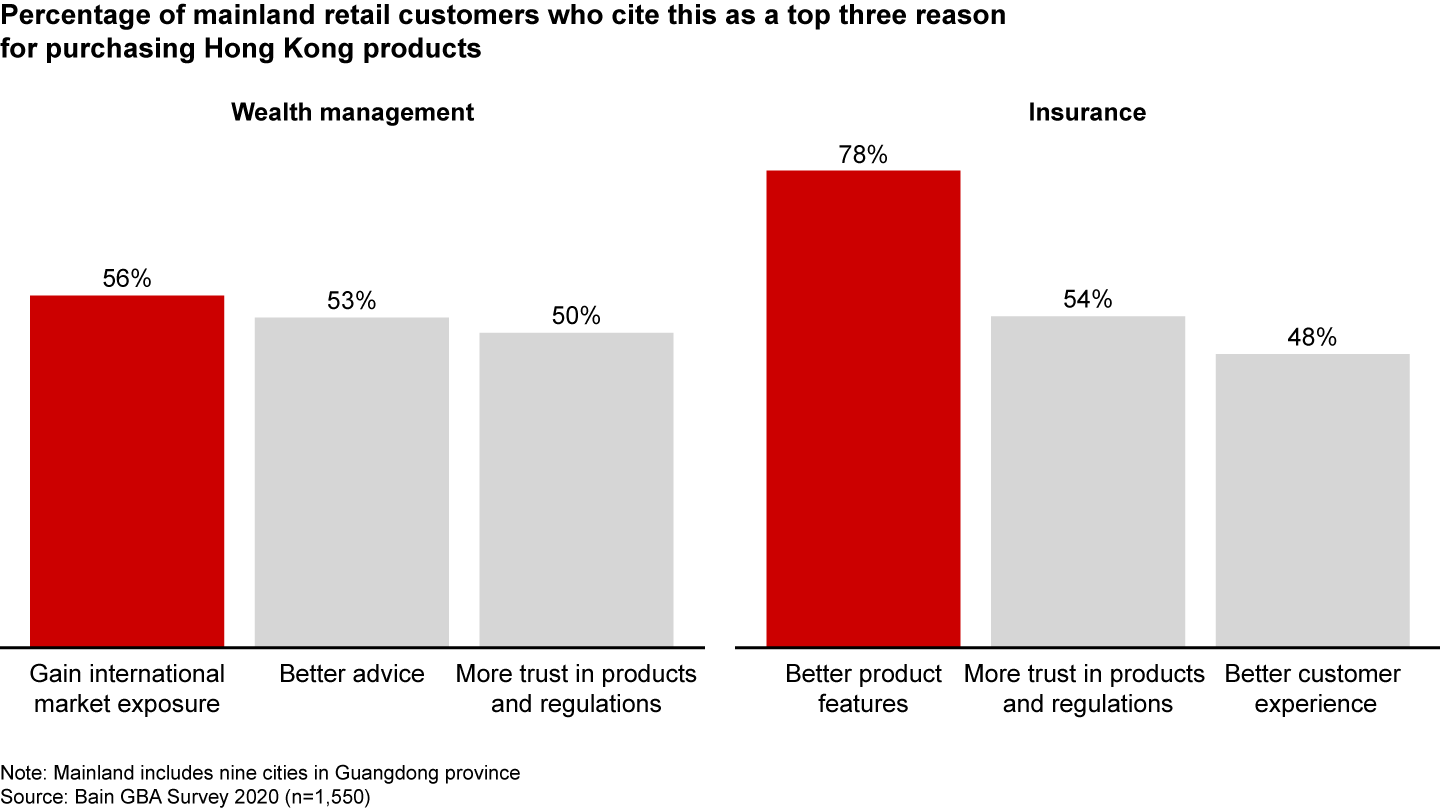
Among mainland retail respondents not interested in cross-boundary insurance, most indicate that they do not adequately understand Hong Kong insurance products, suggesting that insurers can further educate customers about their offerings. In wealth management, those not interested in Hong Kong products cite unattractive returns as a reason, and some feel mainland options already meet their needs (see Figure 4). This points to an opportunity for further product differentiation of Hong Kong products and tailoring to mainland customer needs.
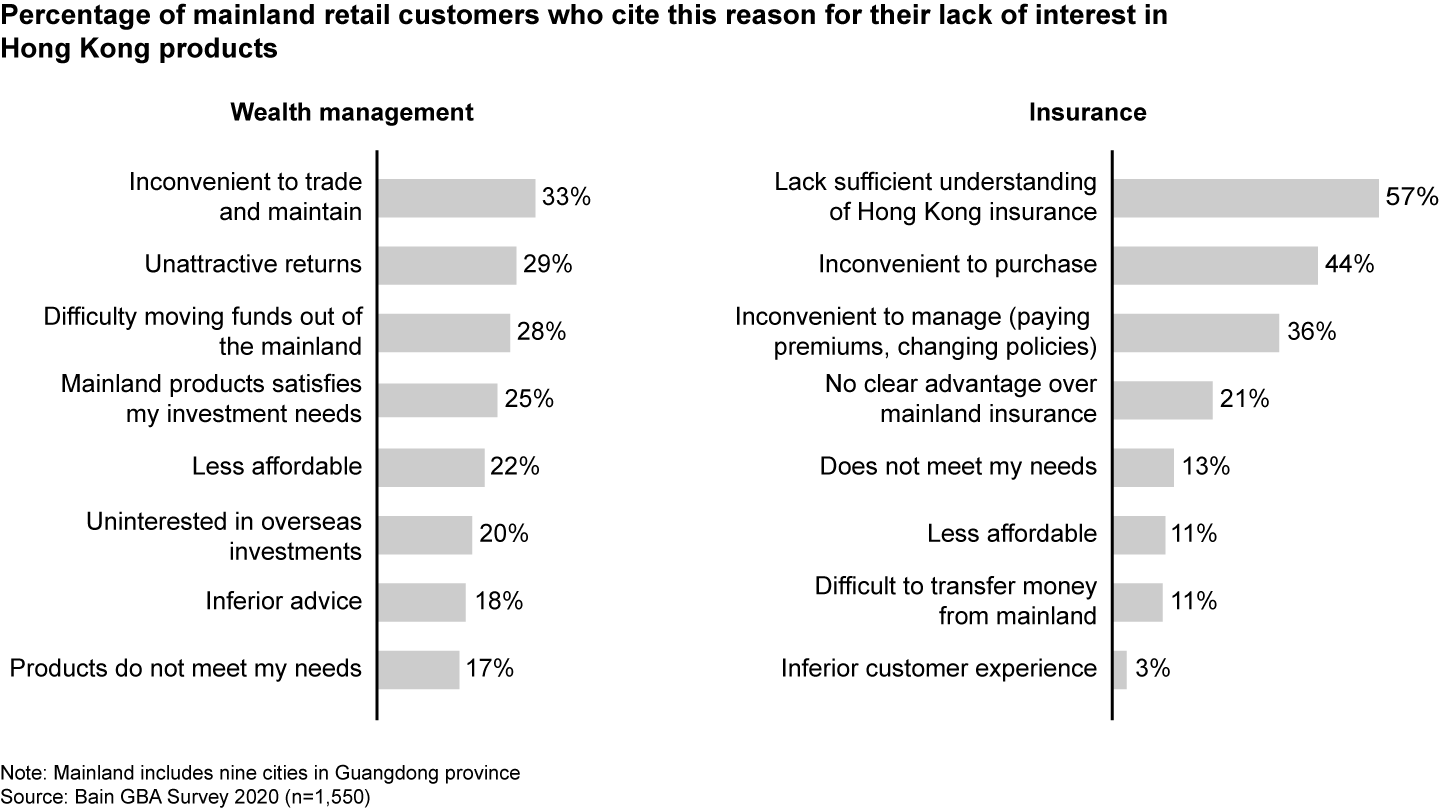
2. Create cross-boundary digital and omnichannel experiences that work for a variety of customers
Customers not interested in cross-boundary products often cite inconvenience. But what constitutes convenience can vary. While many customers prefer an end-to-end digital process, others value a local presence. Mainland customers are sophisticated consumers of digital experiences and have high expectations, notes Mark Saunders, group executive, chief strategy and corporate development officer of AIA Group. This raises the need for insurers to ensure that their digital platforms work seamlessly across the region and to build strong analytics capabilities of their own. AIA, for example, equips its agency force in Hong Kong, Macau, and mainland China with digital capabilities for needs-based analysis and financial health checks, and sees opportunities to leverage these capabilities to serve GBA customers where applicable, assuming regulation permits.
In a separate study, we found up to 90% of mainland respondents prefer to research and interact with insurance companies over digital platforms. Some 60% consider digital the best channel for purchasing and trading wealth management products. Ideally, a digital solution can process simple offerings end-to-end, is personalized, and is integrated into an omnichannel setup where branches, service centers and agents serve customers seamlessly. Some banks are beginning to offer cross-boundary digital functionalities. For example, Hang Seng Bank customers with accounts in both Hong Kong and mainland China can view account information and transfer funds between accounts on their digital banking platform.
Covid-19 added momentum to the shift toward remote channels, even in categories traditionally dominated by in-person service. In response to Covid-19 and since July 2020, a select group of AIA Hong Kong financial planners has been able to help customers purchase certain insurance products remotely via recorded video conferencing, a type of technology that could be applied to cross-boundary insurance servicing, if regulations allow that in the future.
Physical locations will also remain an important part of the omnichannel approach (see Figure 5). They are still highly preferred in certain situations, including by Hong Kong customers looking for advice on more complex products. Even with their strong preference for digital interaction, around 30% of mainland retail customers nevertheless indicate that for them to consider purchasing more cross-boundary products, Hong Kong insurers and wealth management providers must increase their physical presence on the mainland. Having brick-and-mortar locations can also help companies learn the market. Setting up after-sales insurance service centers in mainland GBA cities, for example, offers an opportunity for insurers to understand differences in the markets and their rules, while establishing a foundation for later development and integration, notes Selina Lau of the HKFI.
The way companies think about serving GBA customers is different and will probably require developing new capabilities, new partnerships, and even new business models.
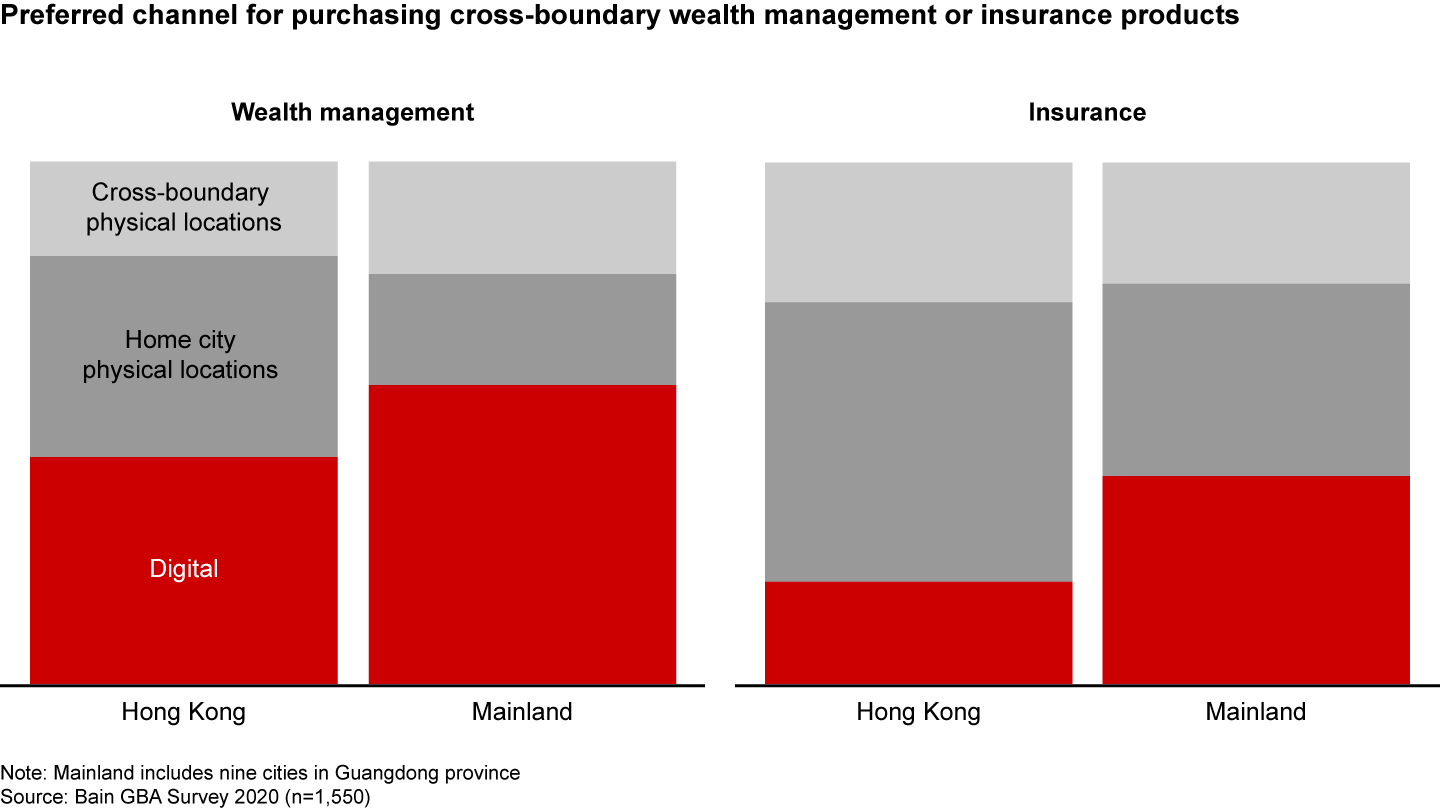
3. Craft an operating model that is focused, collaborative, and appropriate to the region and its growth potential
Creating products designed for unique customer needs and delivering them seamlessly requires a carefully developed GBA strategy and operating model. The idea is to capture the market’s full potential and look at it as one opportunity. Firms should aim to combine the best of Hong Kong, including its well-established expertise in financial advice and network of professional agents, with mainland China’s digital capabilities and local knowledge. This will improve not only the customer experience, but also operational efficiency.
One way to do this is by using ecosystem partnerships to accelerate customer reach and add key capabilities. Health insurers, for example, are now allowed to collaborate across boundaries or with third parties to provide cross-boundary medical services such as claims settlement. Companies including AXA Hong Kong and China Taiping have medical partners across boundaries in mainland China and Hong Kong, which enable customers to receive medical treatment and have the costs directly billed to the insurer. Collaboration between financial services companies and technology firms could create such benefits as boosting insurance companies’ data and analytics capabilities, supporting value-added services such as robo advising, and helping integrate sales and services. There is precedent for this kind of partnership. Hang Seng, partnering with Alipay and WeChat Pay, has worked with select Hong Kong retail merchants to introduce a QR code payment service that accepts mainland China and Hong Kong wallet users’ QR payments for purchases, for example.
While serving cross-boundary customers is not new, companies are trying different operating models in the GBA to balance the need to use resources efficiently, make decisions rapidly and implement new initiatives effectively. A first step is setting joint targets to align the interests of the different regions.
There are any number of potential operating model options: having a dedicated person assigned as the GBA development lead, setting up a joint task force pulled from China and Hong Kong entities, or setting up an independent GBA unit that reports to China, Hong Kong, or directly to the regional office. For financial institutions, finding the optimal operating model is top of the agenda, including deciding whether to operate with a dedicated CEO or a GBA center, as well as ensuring that there is no duplication of roles and responsibilities with existing entities. The right model will depend partly on how a particular company is currently positioned between Hong Kong and mainland China, but whatever version a company settles on, it should aim to launch quickly and adjust flexibly as regulations and the market evolves. There is complexity to manage, but making a strong start today will help companies compete in the future.
Conclusion
It is hard to predict how financial services regulation will evolve in the GBA. However, no matter what exact scenario comes to pass, this is the moment for financial institutions to begin building on recent supportive regulatory momentum, develop a clear GBA strategy, and help shape how the region’s financial services market evolves. Companies should be pioneers and active participants in policy relaxation initiatives, says Gilbert Lee, Hang Seng’s head of strategy & planning and chief of staff to CE.
By taking these steps―carefully differentiating products and services and tailoring them to the needs of GBA customers, delivering seamless cross-boundary digital and omnichannel experiences, and adopting an operating model that aligns the priorities of the regions and focuses on efficiently capturing new opportunities and strong growth―financial services companies can position themselves to make the most of the GBA opportunity.
The authors would like to extend gratitude to all who contributed to this publication, especially Selina Lau from the Hong Kong Federation of Insurers; Jonathan Clarkson and Niki Landolfi from AIA; Rose Cho, Lucia Ku, Gilbert Lee, Judy Qin, and Ryan Song from Hang Seng Bank; and Moritz Anstaedt, Jonathan Chan, Jinsong Chen, Scully Cui, and Derek Ng from Bain.
This report is produced by Bain & Company with information from AIA and Hang Seng Bank (hereinafter referred to as “Information Providers” or each an “Information Provider”) and also based on secondary market research, analysis of financial information available or provided to Bain & Company, and a range of interviews with industry participants. Any views and opinions expressed are those of Bain as of the date of writing and are subject to change. Neither Bain & Company nor the Information Providers have independently verified any such information provided or available to Bain and make no representation or warranty, express or implied, that such information is accurate or complete. Projected market and financial information, analyses, and conclusions contained herein are based on the information described above and on Bain & Company’s judgment, and should not be construed as definitive forecasts or guarantees of future performance or results. Neither Bain & Company, the Information Providers, nor any of these entities’ own subsidiaries or their respective officers, directors, shareholders, employees, or agents accept any responsibility or liability with respect to the use of or reliance on any information or analysis contained in this report. All pictures, tables, and text contents of this report are owned by or licensed to Bain & Company, are protected by copyright laws and various other intellectual property rights of each jurisdiction, and may not be published, transmitted, broadcast, copied, reproduced, or reprinted in whole or in part without the explicit written permission of Bain & Company.

About AIA
AIA Group Limited and its subsidiaries (collectively “AIA” or the “Group”) comprise the largest independent publicly listed pan-Asian life insurance group. AIA meets the long-term savings and protection needs of individuals by offering a range of products and services including life insurance, accident and health insurance and savings plans. The Group also provides employee benefits, credit life and pension services to corporate clients.

About Hang Seng Bank
Hang Seng Bank is celebrating its 90th anniversary this year. Founded in 1933, Hang Seng Bank has continually innovated to provide best-in-class, customer-centric banking, investment, and wealth management services for individuals and businesses. It is widely recognized as the leading domestic bank in Hong Kong, currently serving more than 3.5 million customers. Combining its award-winning mobile app and strong digital capabilities with a vast network of over 260 service outlets in Hong Kong, Hang Seng offers a seamless omni-channel experience for customers to take care of their banking and financial needs anytime, anywhere. Its wholly owned subsidiary, Hang Seng Bank (China) Limited, operates a strategic network of outlets in almost 20 major cities in Mainland China to serve a growing base of Mainland customers locally and those with cross-boundary banking needs. The Bank also operates branches in Macau and Singapore, and a representative office in Taipei. As a homegrown financial institution, Hang Seng is closely tied to the Hong Kong community. It supports the community with a dedicated program of social and environmental initiatives focused on future skills for the younger generation, sustainable finance and financial literacy, addressing climate change, and caring for the community. Hang Seng is a principal member of the HSBC Group, one of the world’s largest banking and financial services organizations.




